Why Are We All Still Watching TV Right Before Bed?
- Watching TV is the top bedtime ritual for U.S. adults, according to a survey.
- Why watch TV before bed? It’s a habit, say 73.1% of adults.
- 72.6% of respondents watch programming on a television set before bed, as opposed to a phone, laptop, or tablet.
- 88.6% of adults say they binge-watch a show at least once a month.
- 80.6% of adults say their binge-watching habits have stayed the same or increased since May 2020.
- 50.4% of adults who watch TV before bed get seven hours of sleep or less each night.
It has happened to everyone. You plan on going to bed at a reasonable hour, and then your Netflix show ends on a cliffhanger. Before you have a chance to turn off the TV, the next episode starts. You’re hooked.
Next thing you know, it’s 1 a.m. You’ve just binge-watched an entire series. Again.
According to a SleepFoundation.org poll, watching television is by far the most popular bedtime ritual for U.S. adults, cited as the go-to routine for 52.7% of sleepers. That’s well above the next two routines: showering or bathing (32%) and talking to a partner (22.9%).
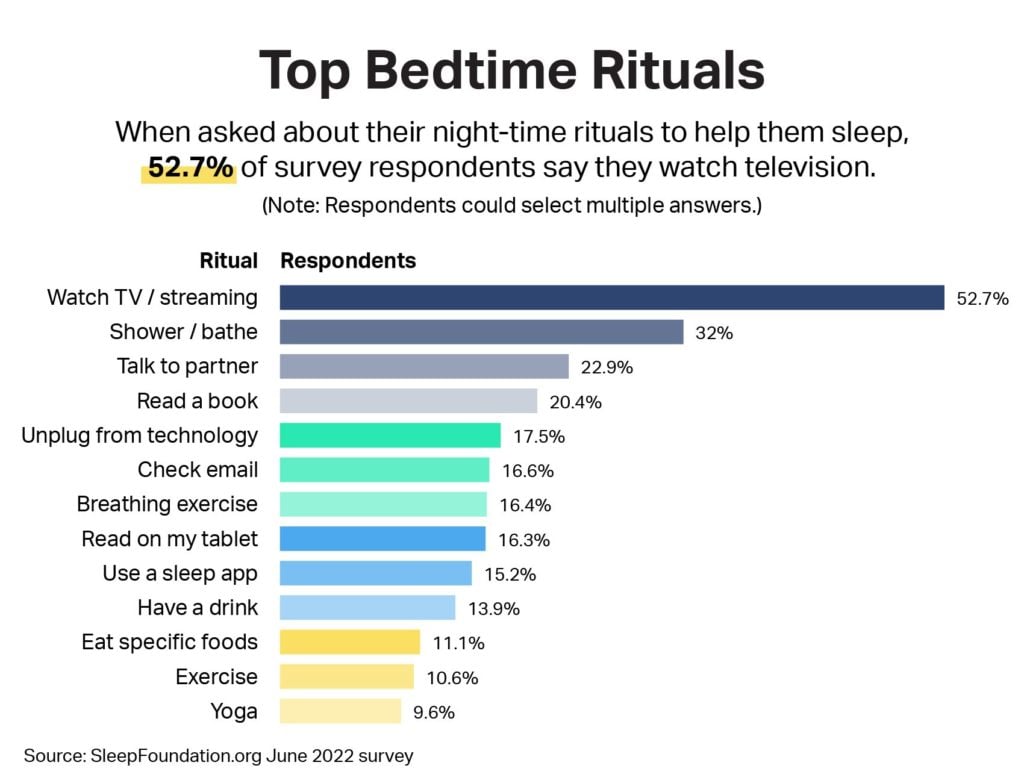
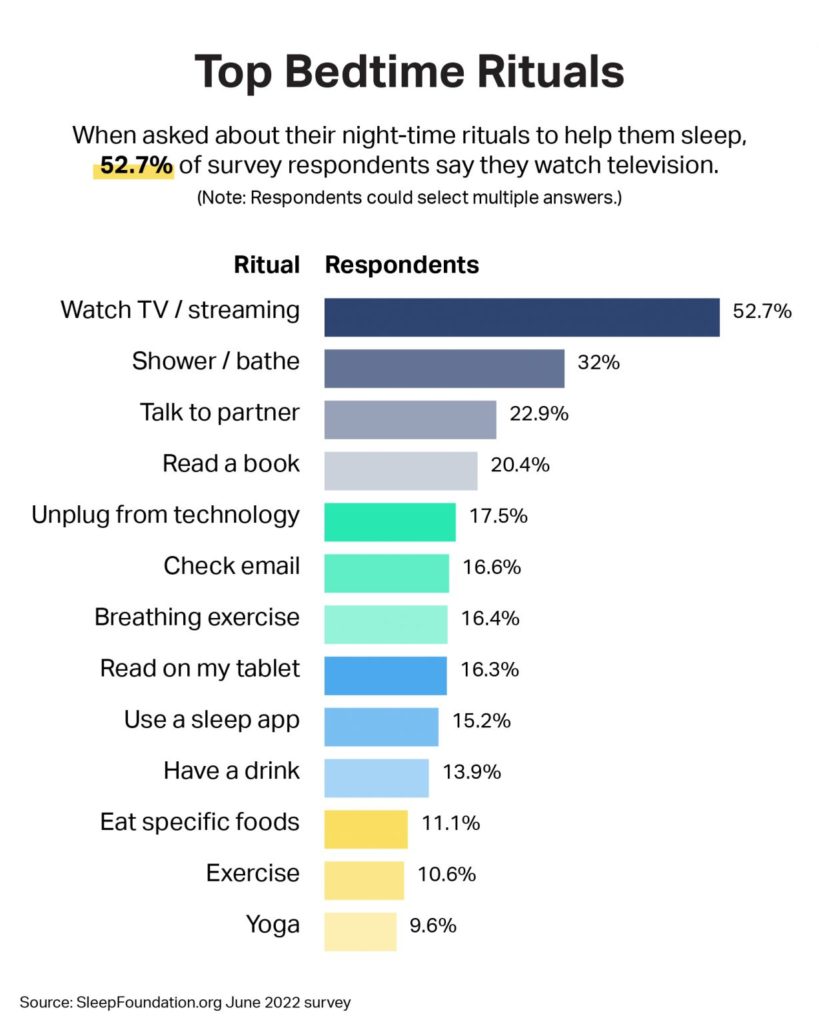
Watching TV before bed is not quite a ritual as old as sleep itself. But it’s ingrained for many of us, as 73.1% of respondents say they watch television before sleeping simply out of habit. Sometimes we watch TV before bed to forget about our problems, as 68% or respondents say. Or it’s the best time to keep up with our favorite shows (66.9%).
Here’s the thing, though: That TV before bed might not be good for us.
“It’s artificial light exposure at the wrong times — at night when the body needs darkness to facilitate sleep — that poses a threat to nightly rest and to your body’s bio clock,” says Dr. Michael Breus, Ph.D., a clinical psychologist and founder of SleepDoctor.com (Sleep Doctor is the parent company of SleepFoundation.org).
So how did we get here? And how do we ensure we get a good night’s sleep, even as streaming services and our devices make it increasingly easier to watch even more TV? Here’s a look.
Looking to improve your sleep? Try upgrading your mattress.
Is TV Time Eating Into Bedtime?
Let’s start with the effect TV time has on our sleep itself.
More than half (50.4%) of SleepFoundation poll respondents say they get seven hours of sleep or less each night on a typical weekday. The American Academy of Sleep Medicine and the Sleep Research Society recommend getting at least seven hours of sleep each night for optimal health. Anything less, regularly, is considered sleep deprivation.
Yes, that’s weird, considering the point of watching TV before bed often is to relax, not to add to our stress by removing sleep. But that may be a side effect, says Craig Richard, Ph.D., professor of biopharmaceutical sciences at Shenandoah University, founder of the website ASMR University, and host of the podcast “Sleep Whispers.”
“Overall, lack of proper sleep has been shown to compromise most aspects of physical and mental health throughout the lifespan,” he says.
And TV certainly has made it easier for that to occur.
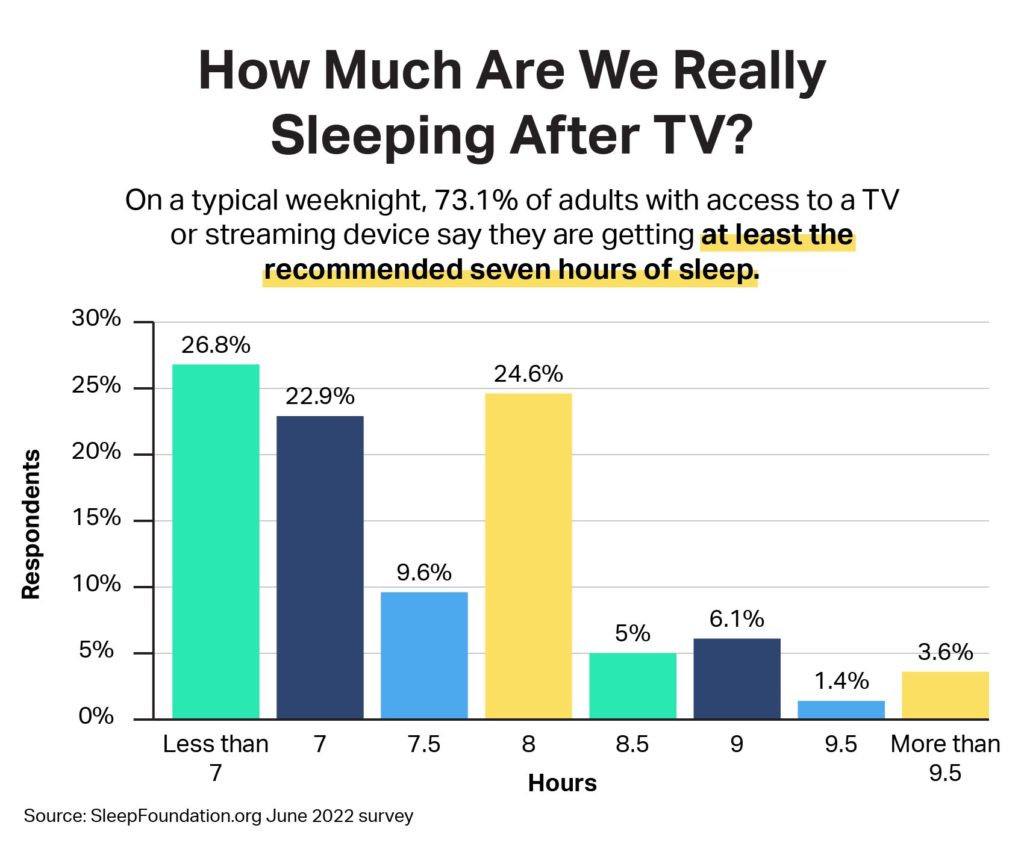
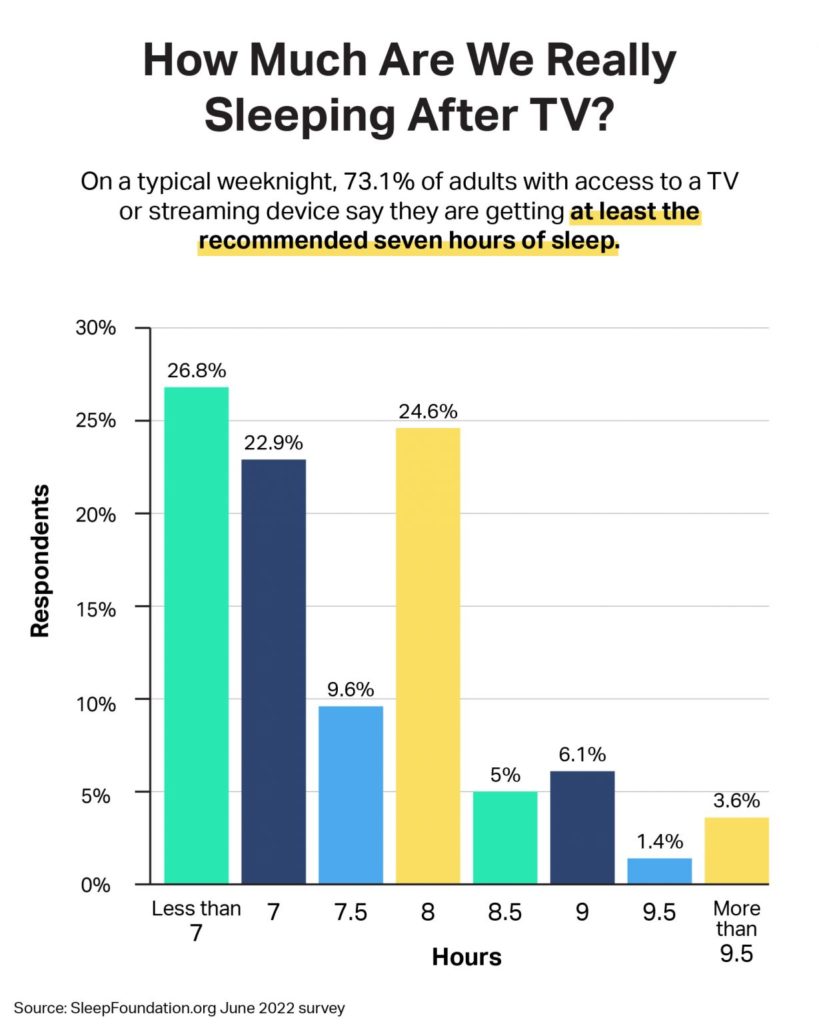
The number of households with televisions jumped from about 20,000 in 1946 to 15.3 million in 1952. It wasn’t long before late-night TV was disrupting the sleep of the American public with the debut of “The Tonight Show” in 1954. Then in 1980, the first 24-hour television news network, CNN, debuted.
High-speed internet brought more entertainment options into our homes. With it came streaming services delivering content on them. These services made rolling from one episode into another much easier. Delivery platforms also changed, with phones, laptops, and tablets making TV-watching portable.
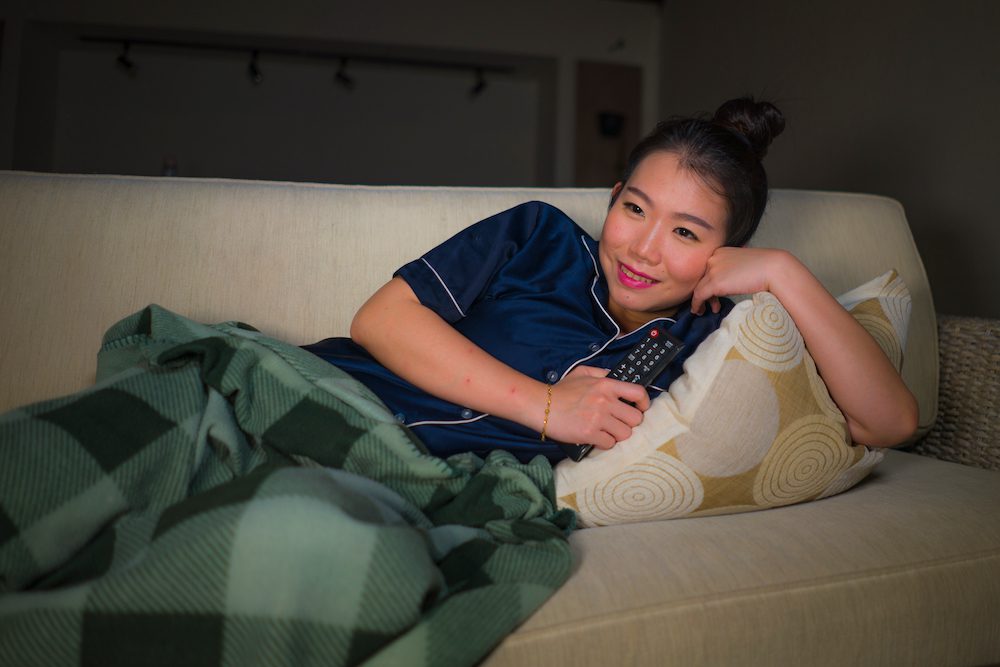
When we watch TV before bed, however, it’s usually still on a television set. SleepFoundation.org’s poll found that 72.6% of U.S. adults sit in front of a television before bed, as compared to a phone (48.6%), laptop (29.2%), or tablet. People ages 54 and older are driving this, with 81.6% of people in this age group using TVs versus 62.6% of people ages 18 to 24. Meanwhile, 59.1% of people ages 18 to 34 use their phones to stream content or browse social media before bed, compared to 18.4% of watchers ages 54 and older.
This doesn’t always mean we’re staying up late, however, as 48.4% of respondents say they go to bed between 10 p.m. and midnight on a typical weekday. But it does differ by state: People in Alabama are most likely to stay up past midnight (58.8%), among those who watch TV before bed. People in Arizona are most likely to go to bed before midnight (86.7%).
Enter Binge-Watching
One thing that has changed: We can now watch tons of the same thing consecutively. And we like doing it.
The popularity of binge-watching increased after Netflix created its streaming service in 2013, with entire seasons of shows becoming available at once.
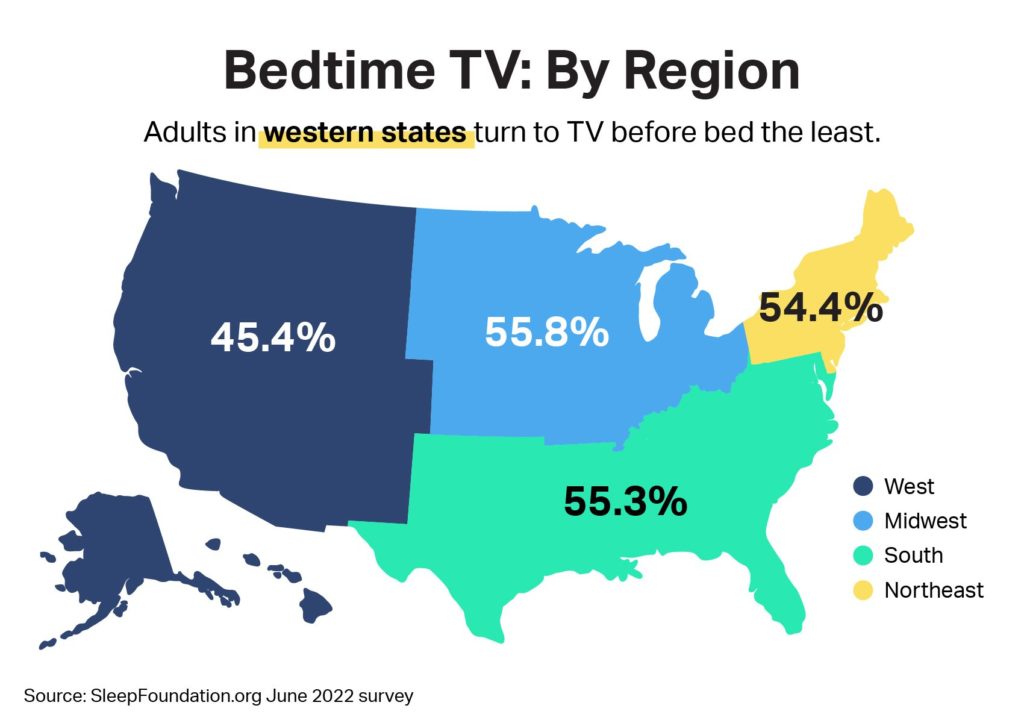
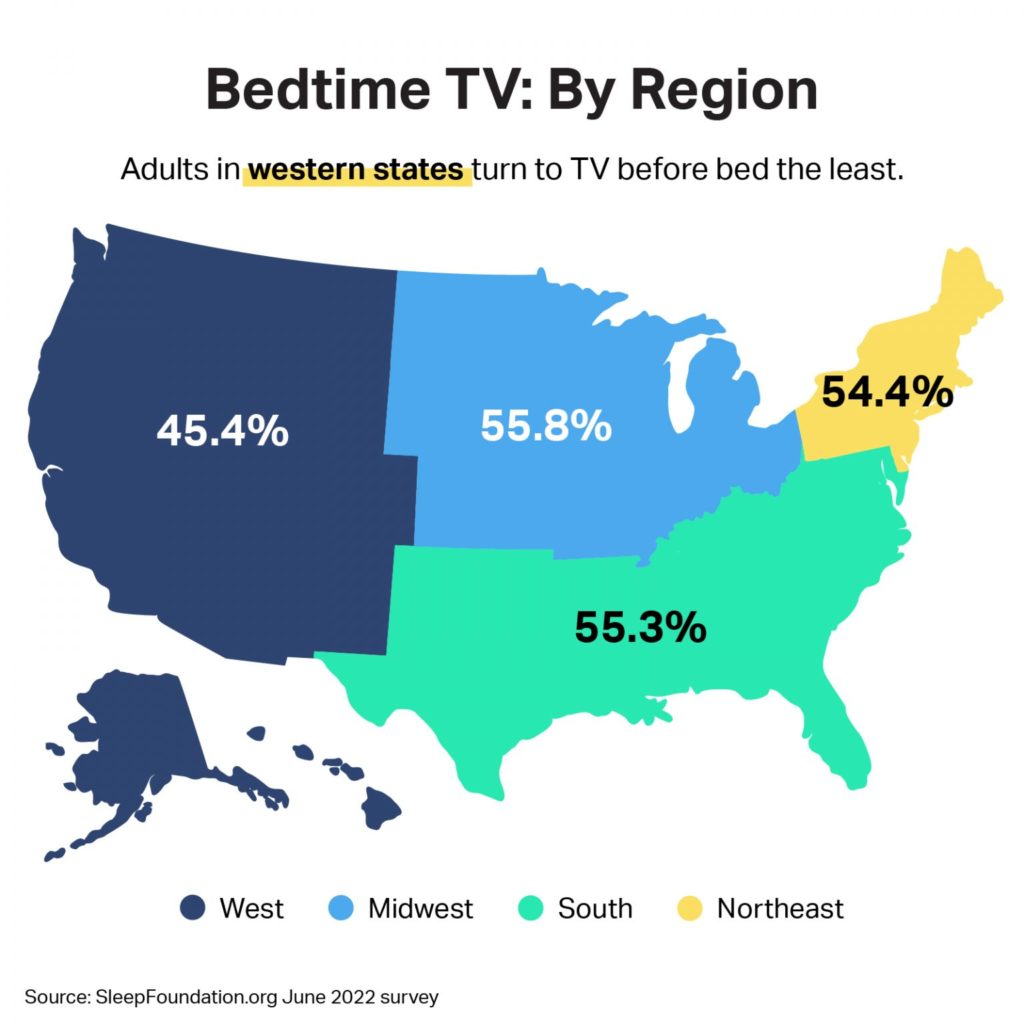
In other words, you’re not alone in binging all of the latest “Stranger Things.” Netflix says the latest season of that show logged 1.15 billion viewing hours in its first 28 days, becoming the first English-language show to do so. That’s roughly 3.5 hours per person in the U.S., for one show.
80.6% of survey respondents say their binge-watching habits have stayed the same or increased in the past two years.
In fact, 88.6% of survey respondents admitted to binge-watching something at least one day a month, and 13.1% say they binge-watch at least 15 days a month. The biggest binge-watchers are between the ages of 35 and 44, with 93.1% saying they binged at least once, compared to 72.4% of survey respondents ages 54 and older.
So much for binge-watching being oh so 2017: 80.6% of survey respondents say their binge-watching habits have stayed the same or increased in the past two years.
Thank the ability to have us skip commercials, recaps, and credits, Richard says.
“Viewers need to have more discipline today — and awareness of the value of sleep — to be able to stick to that promise of, ‘just one more episode,’” he says.
In turn, we may be watching more, even if we’re not sleeping less because of it. About one quarter, or 24.7%, of respondents admitted to watching two hours of TV on a typical night, with 16.8% watching three hours and 18.6% watching four hours or more.
How Nighttime TV-Watching Affects Our Sleep
What’s wrong with all of this? It’s not that the technology or the artificial light that a TV or phone emits is inherently bad for sleep, Dr. Breus says.
The reason why blue light exposure at night interferes with our sleep goes back to our circadian rhythms, our internal biological clock. Televisions and electronic devices emit the same blue light as the sun, disrupting our natural circadian rhythms. They confuse our internal clock.
“Viewers need to have more discipline today — and awareness of the value of sleep — to be able to stick to that promise of, ‘just one more episode.’” — Craig Richard, Shenandoah University
Watching hours of television at night also stimulates your mind at a time when you need to be winding down.
“Laughing through a string of back-to-back episodes of your favorite comedy before bed can leave you wide awake late into the night and exhausted the next day,” Dr. Breus says.
Yes, reading a book — as 20.4% of survey respondents do before bed — can have a similar effect. But getting tired of a book doesn’t mean you’ll likely pick up other books randomly.
“Flipping through channels, or offerings on a streaming service, however, literally happens at the touch of a button,” says Jan Van den Bulck, Ph.D., a professor in the Department of Communication and Media at the University of Michigan who specializes in the media effects on sleep. “That intensifies the experience and makes it easier to keep putting off bedtime.”
It’s not just TV shows that keep us up. Videos on YouTube, TikTok, and other platforms are the programming of choice for 38.8% of adults before bed. As for regular TV series, 36.9% say that was their preferred pre-bedtime entertainment, with 20.9% watching the local news. Close to 30% choose “whatever looks good at the moment.”
Changing the Channel on Your Bedtime Routine
How do you break out of your nighttime TV habit? Start by re-establishing a regular bedtime routine.
This doesn’t mean you have to give up all screens before bed.
Richard says the initial stage of a bedtime routine is all about being still. You can read a book, listen to a podcast, or even watch a show — as long as it’s something you find relaxing.
“Laughing through a string of back-to-back episodes of your favorite comedy before bed can leave you wide awake late into the night and exhausted the next day.” — Dr. Michael J. Breus, TheSleepDoctor.com
At some point, however, it’s time to turn off the TV and put away the phone. Opening a book and reading before bed is an excellent way to quiet the mind before sleeping. If you don’t enjoy reading, Richard recommends turning on a gently narrated audiobook or podcast.
Instead of cutting out media completely, Van den Bulck recommends thinking about media use as a series of triggers, taking note of the content and how it affects you.
The key, Van den Bulck says, is to be aware of what types of screen-based activities cause you stress or lead to binge-watching. If checking your work email or scrolling through social media leads to hours on your phone or computer, avoid those before bed. Knowing how different media affect you and impact your sleep will allow you to adjust your rest accordingly.
Methodology
The survey commissioned by SleepFoundation.org was conducted on the online survey platform Pollfish between June 2 and June 3, 2022. Results are from 1,250 survey participants who were ages 18 and older and lived in the United States at the time of the survey. All attested to answering the survey questions truthfully and accurately.
References
6 Sources
-
Watson, N. F., Badr, M. S., Belenky, G., Bliwise, D. L., Buxton, O. M., Buysse, D., Dinges, D. F., Gangwisch, J., Grandner, M. A., Kushida, C., Malhotra, R. K., Martin, J. L., Patel, S. R., Quan, S. F., & Tasali, E. (2015). Recommended Amount of Sleep for a Healthy Adult: A Joint Consensus Statement of the American Academy of Sleep Medicine and Sleep Research Society. Sleep, 38(6), 843–844.
https://aasm.org/resources/pdf/pressroom/adult-sleep-duration-consensus.pdf -
Ponce de Leon, Charles. (2015). That’s the Way It Is: A History of Television News in America. Chicago, Illinois: University of Chicago Press.
https://press.uchicago.edu/books/excerpt/2015/De_Leon_Thats_Way_It_Is.html -
Dashner, Emma. (n.d.). History of ‘The Tonight Show’. Sutori.com.
https://www.sutori.com/en/story/history-of-the-tonight-show--Ng1rU5UDZhsaVVvNPvGMu95g -
History.com. (2009, November 25). CNN Launches.
https://www.history.com/this-day-in-history/cnn-launches -
Starosta, Jolanta A. and Bernadetta Izydorczyk. (2020). Understanding the Phenomenon of Binge-Watching—A Systematic Review. International Journal of Environmental Research and Public Health, 2020 Jun; 17(12).
https://www.ncbi.nlm.nih.gov/pmc/articles/PMC7344932/#B8-ijerph-17-04469 -
Porter, R. (2022, July 5). ‘Stranger Things 4’ Crosses Billion-Hour Viewing Mark, Netflix Says. The Hollywood Reporter.
https://www.hollywoodreporter.com/tv/tv-news/stranger-things-4-billion-hours-viewing-1235175650/













































































